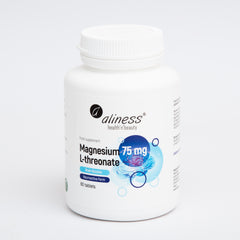Magnesium threonate
An innovative form of magnesium that is gaining more and more followers. Although the form itself is not that efficient in terms of the supply of magnesium ions, the effect of this compound on the body is at least interesting. Researchers found that this compound increases the amount of magnesium ions in the brain, which has a positive effect on the memory and learning process.
Magnesium citrate
One of the most famous forms of this element, i.e. the compound of an organic salt of magnesium and citric acid. Due to the acidic environment, magnesium ions are well absorbed by our body from the digestive system. The only downside to this form of magnesium is that it can have a laxative effect with more (around 10g). However, this is such a large amount that such high doses are rarely used.
Magnesium malate
Like magnesium citrate, this form of magnesium belongs to the organic compounds of magnesium. Malic acid is an interesting addition to magnesium ions. As a naturally occurring fruit acid, it is involved in the production of energy in the body. Additionally, a big advantage of this form of magnesium is its high bioavailability.
Magnesium glycinate (chelated magnesium)
The compound of magnesium ions and the amino acid - glycine is another noteworthy form of this element. Due to the chelate bond between magnesium and glycine, this compound is biologically stable. Magnesium ions can freely enter the small intestine where they are absorbed. This form is recommended for people who need to use much higher doses of magnesium at a time, without fear of laxative effects.

Magnesium taurate
An interesting, although not very popular form of magnesium, which is especially poured on people who use magnesium for the support of the nervous system. Taurine is a non-protein amino acid that occurs naturally in the body. Its presence supports the permeability of cell membranes, which perfectly absorb magnesium.





